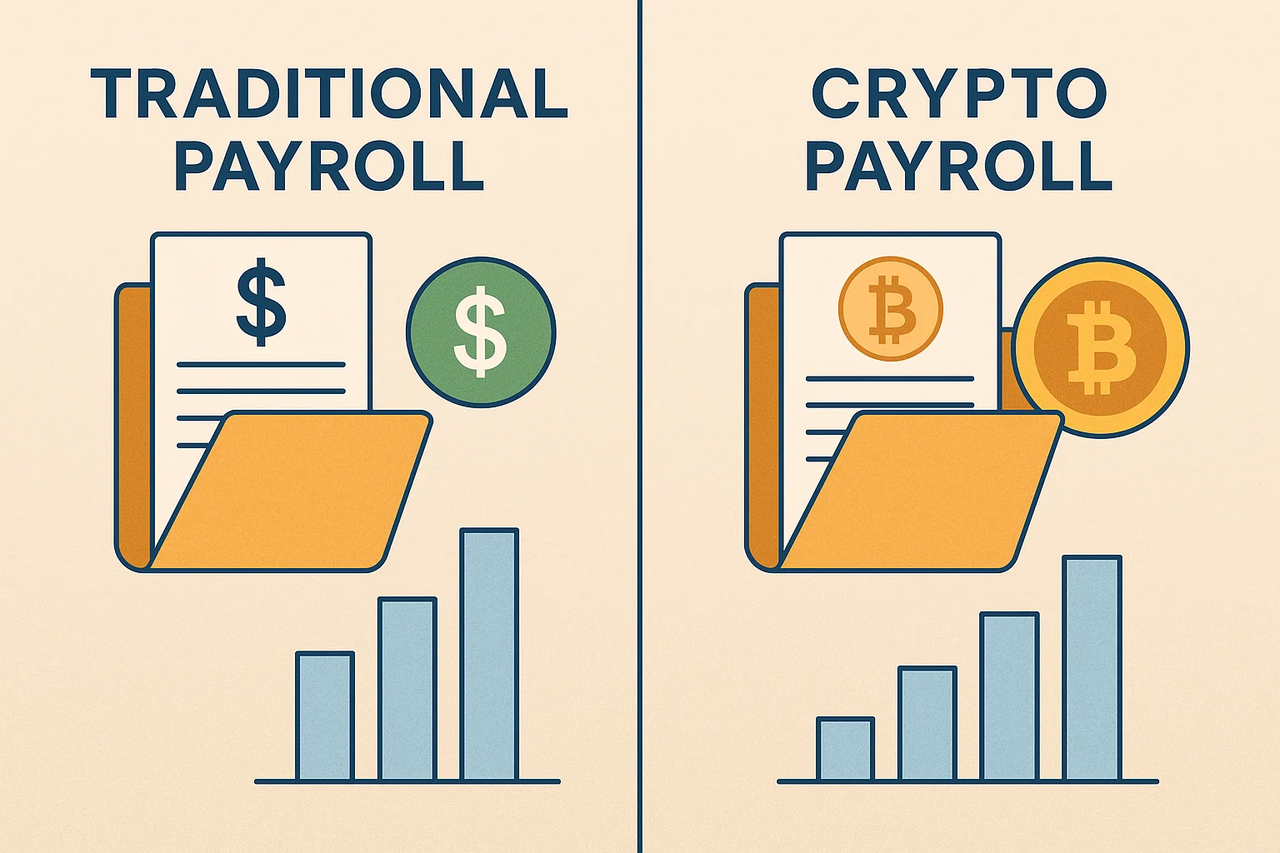Cryptocurrency payroll is changing the way people receive their salaries. It refers to paying wages in cryptocurrency (such as Bitcoin or stablecoins) instead of traditional cash.
In recent years, this trend has intensified as businesses and even governments explore the use of cryptocurrency for payroll. For example, in 2025, Brazilian lawmakers proposed a bill allowing employees to receive part of their salary in Bitcoin. These developments highlight the growing global interest in cryptocurrency payroll as a future method of wage payment. In this article, we will delve into the meaning, operation, advantages and challenges of cryptocurrency payroll, real-world cases from 2023 to 2025, and why it is expected to play an important role in the future financial landscape.
What is Cryptocurrency Payroll?
Cryptocurrency payroll means paying employees or contractors in cryptocurrency rather than traditional fiat currency. In practice, this could mean employers paying wages in Bitcoin, Ethereum, or stablecoins (cryptographic tokens pegged to stable assets like the US dollar) instead of dollars or euros. This concept is relatively new and has emerged as digital currencies gain mainstream recognition as a payment method.
Importantly, cryptocurrency payroll does not have to be all or nothing. Many implementations are optional and flexible. Employees can often choose what portion of their salary to receive in cryptocurrency versus local currency. For example, a worker might choose to receive 20% of their salary in Bitcoin, with the remainder paid in dollars. Dedicated payroll services (like Bitwage or Coinbase's payroll program) can convert that portion into cryptocurrency on payday and send it to the employee's digital wallet. This makes the process seamless for both employers and workers—employers pay salaries as usual, while the service handles the cryptocurrency conversion in the background. As of the mid-2020s, more and more companies (including crypto industry firms like Coinbase and Blockchain.com) are offering such options to their employees, and new platforms have emerged to facilitate global cryptocurrency and stablecoin payroll payments.
How Does Cryptocurrency Payroll Work?

In a cryptocurrency payroll system, the mechanism for paying wages has some unique aspects compared to traditional payroll:
Methods and Currency
Payment Method: Employers do not need to deposit money into employees' bank accounts but instead send cryptocurrency to the employees' crypto wallet addresses. This requires both parties to have compatible digital wallets (usually provided by exchanges or fintech applications). Some employers may hold cryptocurrency as a payroll reserve, while others convert fiat currency into cryptocurrency through exchanges or payment processors for each payroll cycle.
Currency Options: Employers may offer multiple cryptocurrency options. Common choices include Bitcoin and Ethereum, but many prefer stablecoins (like USDC or USDT) to avoid volatility. Stablecoins maintain a 1:1 value with fiat currency, so if the payroll includes $2,000 worth of a dollar stablecoin, it equates to about 2,000 tokens, ensuring value stability.
Processing
Payroll Processing: Companies can use cryptocurrency payroll providers or software integrated with their HR systems. On payday, the system calculates each employee's net pay (as usual) and then automatically converts the specified amount into cryptocurrency based on real-time exchange rates. After that, the cryptocurrency is transferred to the employee's wallet. All of this can be completed in just a few minutes.
Taxation and Record-Keeping: Even if wages are paid in cryptocurrency, employers must calculate taxes and withholdings based on the local currency value. Many cryptocurrency payroll services generate reports showing the fiat value of the cryptocurrency paid for tax reporting purposes. Employees may receive pay stubs indicating that they received a certain proportion of Bitcoin worth X dollars on payday.
Opt-In Principle: Crucially, the implementation of most cryptocurrency payrolls is voluntary. Employees can choose to participate. For example, proposed legislation in Brazil and some U.S. states stipulates that cryptocurrency payroll payments are optional and partial—employees can freely choose to accept or decline, but must still receive at least a portion of their wages in local currency. This ensures that no one is forced to accept volatile compensation and complies with labor laws (such as minimum wage being paid in fiat currency).
By operating this way, cryptocurrency payroll systems aim to provide employees with more options while not significantly disrupting existing accounting practices. Next, we will compare the pros and cons of cryptocurrency payroll versus traditional payroll methods in key areas such as cost, speed, and accessibility.
Traditional Payroll vs. Cryptocurrency Payroll

One of the simplest ways to understand cryptocurrency payroll is to compare it with traditional payroll. Traditional payroll typically involves bank transfers (direct deposits) or checks issued in local currency. Cryptocurrency payroll uses blockchain transactions to issue digital currency to employees. This fundamental difference leads to several key distinctions:
Transaction Costs
Traditional international payroll methods can incur high bank fees and currency conversion costs. Companies paying wages to overseas employees often have to pay wire transfer fees and intermediary bank charges. In contrast, cryptocurrency transfers occur on blockchain networks, where transaction costs are typically much lower. For example, remitting funds via Bitcoin or other cryptocurrencies may only require a small network fee, unrestricted by national borders, thus reducing costs for employers and potentially increasing employees' net wages.
Payment Speed
Traditional payroll transfers, especially cross-border ones, can be slow. Overseas direct deposits may take several days to clear through banks. Cryptocurrency payroll can significantly speed up this process. Blockchain transactions can settle almost in real-time—usually within minutes or hours—regardless of where the sender and recipient are located. This means employees in another country can receive their wages on the same day as the remittance, without having to wait until the weekend. Fast settlement is particularly beneficial for freelancers or contractors who want immediate payment after completing work.
Global Accessibility
Traditional payroll relies on banking systems. People need to have a bank account to easily receive wages, which excludes millions of "unbanked" individuals worldwide. Cryptocurrency payroll only requires an internet connection and a crypto wallet, which can be set up on a smartphone. This borderless access allows employees to receive funds globally without relying on traditional banks. In areas with limited banking infrastructure or unstable local currencies, paying wages in cryptocurrency could enhance financial inclusion.
The above image compares the differences between traditional payroll and cryptocurrency payroll in terms of average transaction costs, payment speed, and accessibility. We can see that traditional payroll typically involves higher fees (such as bank or wire transfer fees) and slower processing times (with cross-border payments taking days), while cryptocurrency payroll can significantly reduce costs and complete transactions within hours or even minutes.
The speed difference is striking: cross-border bank transfers may take about 3 days (72 hours) to fully settle, while Bitcoin or stablecoin payments can settle via blockchain in about an hour or less. In terms of cost, traditional international payroll payments may incur fees of tens of dollars, while cryptocurrency network fees may be less than a dollar. Finally, the accessibility column emphasizes that cryptocurrency payroll can cover a broader range of workers. Traditional systems require bank accounts, which not everyone has, while anyone with a smartphone can receive cryptocurrency wages, thus expanding global financial channels. This graphic illustrates why many believe cryptocurrency payroll is a faster, cheaper, and more inclusive alternative to traditional wage payment methods.

Benefits of Cryptocurrency Payroll
Why would employers and employees consider using cryptocurrency to pay wages? Cryptocurrency has several notable advantages:
Payment and Costs
Lower Fees and Costs: As mentioned, blockchain transactions can eliminate many banking intermediaries. Companies with global employees can save on international wire transfer fees and foreign exchange costs by paying in cryptocurrency. Lower operational costs mean more efficient payroll processing and sometimes higher net wages for employees (due to fewer deductions for transfer fees).
Faster Payments: Cryptocurrency payroll enables near-instant wage payments. Employers do not need to initiate payments several days in advance but can transfer cryptocurrency on payday, with employees typically receiving funds the same day. This speed is particularly advantageous for gig economy workers or contractors who rely on quick payments. It also means no waiting over weekends or holidays—blockchain networks operate around the clock.
Global Borderlessness: One major advantage of cryptocurrency payroll is the ability to seamlessly pay wages to anyone, anywhere. A company based in the U.S. can pay a freelancer in Asia or Africa within minutes without worrying about bank hours or international banking codes. This creates opportunities for global talent recruitment. It is also beneficial in regions with unstable banking systems—employees can receive a stablecoin that retains value even if the local currency rapidly depreciates.
Empowering Employees, No Waiting for Banks
Empowering Employees: Cryptocurrency payroll allows employees to better control their financial situation. They can choose to receive part of their salary in Bitcoin as an investment, convert it to local currency, or use stablecoins to maintain stability. This flexibility enables employees to hedge against inflation or benefit from digital currencies without being tied to a single currency.
Attracting Talent: Offering cryptocurrency compensation can attract young, tech-savvy talent, especially millennials and Gen Z, who view cryptocurrency as the future. Many in these demographics are willing to accept part of their salary in cryptocurrency, making it an appealing benefit. Companies using cryptocurrency compensation demonstrate innovation, resonating with these groups and receiving positive feedback from early adopters.
Sustainable Economy: Cryptocurrency payroll supports 24/7 payments without waiting for bank hours, making it ideal for global teams across time zones. Employers can process payroll on weekends or holidays without delays. Blockchain can streamline cross-border payment processes, improve liquidity and cash flow management, while ensuring employees receive funds on time.
These advantages illustrate why cryptocurrency payroll is becoming increasingly popular as a modern wage payment solution. However, it is not without challenges. Employers and employees should weigh the pros and cons before making a choice.
Challenges and Risks of Cryptocurrency Payroll

While cryptocurrency payroll has exciting advantages, there are also significant challenges and risks to consider:
Volatility of Cryptocurrency
The most well-known drawback is price volatility. The value of cryptocurrencies like Bitcoin can fluctuate significantly on a daily basis. This means that if you receive part of your salary in Bitcoin, the value of that money may decrease (or increase) by the time you actually use it. For example, Bitcoin's price has experienced huge fluctuations over the course of a year, which can affect the actual value of employees' wages. This volatility risk is one reason many cryptocurrency payroll solutions use stablecoins to pay wages—stablecoins are designed to avoid price fluctuations, so $100 worth of stablecoin today should still be $100 tomorrow. Nevertheless, if employees choose more volatile cryptocurrencies, they take on the risk of their actual income potentially decreasing. Employers need to ensure that employees understand this risk. Due to these value fluctuations, some jurisdictions even require employees to consent to being paid in cryptocurrency (as is the case with regulations in Japan).
Regulatory and Tax Uncertainty
The rules regarding the use of cryptocurrency for payroll are still evolving. Different countries have varying stances—some have embraced cryptocurrency payments, while others have banned the use of cryptocurrency as a payment method. These fragmented regulations can make compliance tricky. Employers must understand how to report cryptocurrency wages for tax purposes and ensure that all income taxes are correctly withheld. In many places, wages must be recorded in the local fiat currency, so even if paid in cryptocurrency, accounting systems must record the equivalent fiat amount. Regulatory issues are quite severe: for example, in the U.S., cryptocurrency regulations remain inconsistent, which can complicate implementation. Companies need to stay updated on the law and may need to seek legal counsel to ensure proper handling of cryptocurrency payroll. Proposed legislation in Brazil for 2025 explicitly states that the proportion of cryptocurrency payments cannot exceed 50%, with the remainder required to be paid in local currency, indicating that lawmakers may take protective measures. Until clear and uniform regulations are established, this area will remain a challenge.
Technical and Infrastructure Barriers
Using cryptocurrency to pay employee wages requires appropriate technological infrastructure. Businesses may need new systems or partners to efficiently handle blockchain transactions. Setting up wallets, securely storing funds, and integrating cryptocurrency payments into existing payroll software can be quite complex. Employees also need a learning process: they must be proficient in using digital wallets and securely managing private keys (which control access to funds). If they are not familiar with cryptocurrency, they may make mistakes, such as losing access to their wallets or falling victim to scams. Employers may need to provide relevant training or choose user-friendly services that allow employees to automatically convert their cryptocurrency wages into cash if they wish. Ensuring network security is another aspect; handling cryptocurrency means guarding against hacking or theft, which may be a new area for HR departments accustomed to traditional banking.
Financial Reporting and Volatility Management
For companies, accounting for cryptocurrency transactions can be quite tricky. The value of cryptocurrency wage expenditures needs to be recorded in the books, and if a company holds any cryptocurrency, it means that cryptocurrency itself is an asset whose value may fluctuate. Companies may face challenges in assessing the value of these assets in their financial statements. Additionally, if employers decide to hold cryptocurrency reserves (for wage payments or as part of their finances), they will bear the volatility risk on their balance sheets. Many companies mitigate this risk by converting fiat currency to cryptocurrency in real-time at each payroll, rather than holding large amounts of cryptocurrency long-term. Some tools and services are emerging to help address these issues, but for most finance teams, this remains a learning process.
Employee Preferences and Trust
Not everyone is welcoming of cryptocurrency. Some employees (especially those unfamiliar with cryptocurrency or who have experienced scams or crashes) may feel uncomfortable receiving wages in digital currency. It is crucial that cryptocurrency payroll remains optional. Employers offering cryptocurrency payroll should also provide guidance on how to use or convert cryptocurrency so that employees feel confident using their payroll for rent, groceries, and other necessities. Building trust is key—employees need to believe that the value they receive is fair and easily accessible. Over time, as cryptocurrency becomes more mainstream and regulations improve, employee comfort levels may rise. However, during the transition period, clear communication and options are essential.
In summary, managing cryptocurrency payroll comes with several risks and barriers that must be addressed. Price volatility, regulatory ambiguity, technical complexity, and personal comfort levels are all factors to consider. Companies trialing cryptocurrency payroll typically take a cautious approach: voluntary adoption, employee training, using stablecoins to reduce risk, and partnering with established cryptocurrency payment providers to handle the heavy lifting (and compliance). Now, let’s look at some real-world cases of cryptocurrency payroll management and what they reveal about this trend.
Real-World Examples and Adoption

Cryptocurrency payroll has moved from theory to practice in many places. Here are some notable real-world developments from 2023 to 2025 that showcase the evolution of this trend:
Bitcoin Payroll in Brazil
In March 2025, a Brazilian congressman proposed a bill aimed at regulating Bitcoin payroll. The proposal (Bill PL 957/2025) would legalize voluntary payment of wages in cryptocurrency, allowing employees to choose to receive part of their salary in Bitcoin while ensuring that at least 50% is paid in Brazilian currency (Brazilian Real). This move aims to give employees and employers more freedom in financial arrangements while protecting them from the full impact of cryptocurrency volatility. Brazilian congressman Luis Felipe de Orleans e Bragança stated that this initiative is expected to boost Brazil's fintech industry and attract cryptocurrency investment. He noted that it reinforces "the autonomy of will," meaning individuals can agree on how to be compensated. The bill also cites successful examples from other countries, pointing out that Japan allows the use of cryptocurrency for payroll under certain guidelines, while Portugal's regulations encourage the adoption of cryptocurrency in finance. Although the bill was still under debate at the time, its introduction strongly indicated that the concept of cryptocurrency payments has become mainstream in a major economy.
Bitcoin Payroll Proposal in Oklahoma
Not only countries but even subnational regions are getting involved. In the U.S., Oklahoma State Senator Dusty Deevers introduced the "Bitcoin Freedom Act" in early 2025, allowing employees in Oklahoma to receive wages in Bitcoin. This groundbreaking state legislation aims to empower employees by expanding payment options. Under the proposal, employers can choose to pay wages in Bitcoin, and employees can opt to receive part or all of their wages in Bitcoin. The bill also includes educating employees about the risks and benefits of cryptocurrency to ensure they make informed decisions. The motivation behind this initiative aligns with financial innovation—enabling people to better control their compensation methods (financial independence) and keep pace with the growing trend of cryptocurrency applications. While U.S. federal law does not explicitly prohibit cryptocurrency payroll, such state-level initiatives provide a legal framework and encouragement. If Oklahoma's experiment is successful, it could set a precedent for other states. This echoes earlier statements from places like Wyoming and Miami, which expressed openness to cryptocurrency in government and finance, helping to establish cryptocurrency-friendly hubs in the U.S.
Companies Using Cryptocurrency for Payroll
In recent years, many companies, especially in the tech and cryptocurrency sectors, have begun offering cryptocurrency payroll options to employees. For example, one of the largest cryptocurrency exchanges, Coinbase, has allowed its employees to receive part of their salary in cryptocurrency for a period of time. Blockchain.com (a cryptocurrency wallet company) and GMP Group are also early adopters. Beyond cryptocurrency-native companies, global freelance platforms and payment providers have integrated cryptocurrency payments. In 2023 and 2024, as remote work expanded, platforms like Deel and Remote reported that more clients were using stablecoins to pay international contractors, citing faster speeds and lower fees. Additionally, startups like Bitwage and Rise specialize in providing cryptocurrency payroll services. They allow any company to easily pay in cryptocurrency without having to handle the cryptocurrency themselves (the service converts and sends payments). These real-world services demonstrate that cryptocurrency payroll is not just a concept but a viable operation. They have enabled thousands of workers worldwide to receive wages in cryptocurrency.
Public Figures and Cryptocurrency Compensation
Some high-profile cases have also drawn attention to cryptocurrency compensation. From late 2021 to 2022 (setting the stage for our discussion), several U.S. mayors announced they would receive part of their salaries in Bitcoin, making headlines. For example, the mayors of Miami and New York City exchanged part of their salaries for Bitcoin, aiming to showcase their confidence in the future of cryptocurrency. In professional sports, some athletes have negotiated to receive bonuses or part of their salaries in cryptocurrency. By 2023, these cases helped normalize the concept of cryptocurrency payments, indicating that individuals can "be paid in Bitcoin" and immediately convert or hold it according to their preferences. While these cases are often symbolic or optional, they contribute to increasing acceptance and awareness of cryptocurrency.
Global Regulatory Landscape
The acceptance of cryptocurrency payroll varies around the world. We see that Japan allows the use of cryptocurrency with employee consent, while Portugal's flexibility is a positive case. On the other hand, countries like Turkey and Russia have laws prohibiting the use of any cryptocurrency for payments, including wages. Meanwhile, El Salvador (which made Bitcoin legal tender in 2021) also allows wages to be paid in Bitcoin. However, even El Salvador has had to adjust its policies—after reaching an agreement with the International Monetary Fund, they no longer allow tax payments or government fees to be paid in cryptocurrency. These mixed practices from 2023 to 2025 indicate that countries are exploring how to integrate cryptocurrency into payroll. Progressive regulations can encourage cryptocurrency payroll (as seen in proposals from Brazil and Oklahoma), while restrictive regulations may hinder its development. Over time, as early adopters generate more data and results, we may see more countries updating labor and tax laws to address cryptocurrency payroll issues.
These cases indicate that cryptocurrency payroll is becoming a reality in various contexts—from government legislation to corporate practices, and individual choices. The period from 2023 to 2025 has particularly experienced rapid development, with important legal frameworks emerging and an increasing number of mainstream entities beginning to accept this concept. This lays the groundwork for our final thoughts: what do these trends mean for the future of wage payments?
The Future of Wage Payments: Embracing Cryptocurrency?

Given the current trends, cryptocurrency payroll may play an important role in future wage payments. The experiments and initiatives of recent years may just be the beginning. Here are some insights into future developments:
Wider Adoption
As technology matures and regulations become clearer, more companies will be eager to offer cryptocurrency payroll. We can foresee that in the future, employers will provide cryptocurrency payment options in addition to direct deposits. This may first appear in cutting-edge tech industries and gig platforms, gradually expanding from there. The strong interest of younger generations (millennials and Gen Z) in cryptocurrency payments suggests that as these groups dominate the labor market, the demand for cryptocurrency compensation schemes will rise. Employers looking to remain competitive in talent recruitment may adopt cryptocurrency payroll to attract and retain top talent.
Improved Infrastructure
The cryptocurrency industry is working to develop solutions that make using cryptocurrency as convenient as using banking applications. We anticipate better wallet user experiences, greater adoption of stablecoins, and the integration of cryptocurrency payments into existing financial applications. For example, one day your regular banking app might also include a cryptocurrency wallet feature, allowing your employer to send you cryptocurrency that appears in your bank balance. Projects capable of expanding blockchain capacity (to process large volumes of transactions quickly and at low cost) will also support payroll use cases. Additionally, central bank digital currencies (CBDCs)—essentially government-backed crypto dollars or euros—may emerge, combining the advantages of cryptocurrency (speed, always online) with the stability of official currencies. If CBDCs are officially launched, they could be used for payroll payments like cash, but would evolve along modern lines.
Embedded Finance and New Payment Methods
Financial experts are exploring new "tracks" for the flow of funds, which are new networks and technologies for value transfer. Blockchain is one such track. Future payrolls may mix various methods: some companies using traditional bank ACH, while others use blockchain, depending on which method is most efficient. Companies like Brightwell (which appeared on the 2025 Convera podcast) initially provided global payroll for cruise lines and later evolved to use blockchain-based solutions for cross-border payments. Notably, cryptocurrency and blockchain are gradually being integrated into the financial system. You might not even realize that cryptocurrency is behind it— for example, you could receive your salary in dollars, but behind the scenes, the company uses stablecoins and blockchain to transfer money to your local payroll department more quickly. This hybrid model may become common, blending new and old models for optimal results. Future global payrolls may become more decentralized, with value flowing directly between global employers and employees over the internet.
Enhancing Financial Inclusion
Looking ahead, cryptocurrency payroll has the potential to bring more people into the formal economy. Imagine a freelancer in a country with limited banking services receiving immediate payment in stablecoins backed by dollars—they now effectively have dollar income without needing a U.S. bank account. They can save, spend (using a crypto debit card or converting Bitcoin to cash when needed), or invest further. This could empower people in emerging markets or communities lacking banking services. With the proliferation of smartphones and internet connectivity, cryptocurrency payroll could ride this wave, benefiting anyone with internet access. This aligns with the global goal of enhancing financial inclusion and could reduce the reliance on cash in turbulent economies.
Addressing Challenges
Of course, the future is not without obstacles to overcome. Regulators may establish more specific cryptocurrency payroll laws to protect employees (ensuring they understand their rights, receive fair exchange rates, etc.). We may see requirements for disclosing exchange rates on payrolls or mandates for using stablecoins for wages above a certain amount to limit risk. Tax authorities will improve the reporting and taxation of cryptocurrency income, hoping to simplify processes so that both employers and employees can comply easily. Security will also be crucial—the industry needs to continue improving safeguards to ensure that cryptocurrency payroll payments are as secure and fraud-resistant as possible. User education will continue to play an important role; future payroll systems may include tutorials or tools to help employees manage their cryptocurrency wages safely.
Mainstream Acceptance
In the coming years, paying wages in cryptocurrency may become as commonplace as direct deposits are today. Discussions may shift from “Why pay with cryptocurrency?” to “Why not?” We are already seeing the beginnings of this normalization: countries like Brazil are discussing national policies, U.S. states are considering updating laws, major companies are implementing various schemes, and the new generation of workers is enthusiastic about digital currencies. As these factors converge, cryptocurrency payroll will transition from a niche innovation to a standardized component of how we are compensated.
Cryptocurrency payroll represents a significant transformation in the wage payment landscape, combining technology and finance to meet the needs of a global digital workforce. It offers speed, savings, and inclusivity that traditional systems struggle to match, making it an attractive vision for the future. However, realizing this vision fully will require addressing challenges related to market volatility, regulation, and education. Between 2023 and 2025, cryptocurrency payroll has made rapid progress. From legal reforms in Brazil to pioneering efforts in places like Oklahoma, there is strong momentum for its development. If this trend continues, it is likely that in the next decade, receiving wages via blockchain will be as common as receiving wages through banks. For workers and employers alike, cryptocurrency payroll opens up new possibilities. In summary, keeping an eye on the future developments of cryptocurrency wage payments will be exciting.
免责声明:本文章仅代表作者个人观点,不代表本平台的立场和观点。本文章仅供信息分享,不构成对任何人的任何投资建议。用户与作者之间的任何争议,与本平台无关。如网页中刊载的文章或图片涉及侵权,请提供相关的权利证明和身份证明发送邮件到support@aicoin.com,本平台相关工作人员将会进行核查。




